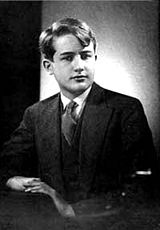Nicolás Gómez Dávila
| Nicolás Gómez Dávila | |
|---|---|

Gómez Dávila in 1930, aged 17.
|
|
| Born |
May 18, 1913 Bogotá, Colombia |
| Died | May 17, 1994 (aged 80) Bogotá, Colombia |
| Nationality | Colombian |
| Alma mater |
University of Paris University of Los Andes (co-founder) |
| Era | 20th-century philosophy |
| Region | American philosophers |
| School |
Traditionalist conservatism Integralism |
|
Main interests
|
Politics, religion |
|
Notable ideas
|
Anti-modernism Authentic reactionary |
|
Influences
|
|
Nicolás Gómez Dávila (18 May 1913 – 17 May 1994) was a Colombian writer and thinker who is considered one of the most stalwart conservative and reactionary political theoreticians of the twentieth century.
Gómez Dávila's fame began to spread only in the last few years before his death, particularly by way of German translations of his works. He was one of the most radical critics of modernity whose work consists almost entirely of aphorisms which he called "escolios" ("glosses").
Gómez Dávila was a Colombian scholar who never held any university post but spent most of his life in the circle of his friends and within the confines of his library. He belonged to the upper circles of Colombian society and was educated in Paris. Due to severe pneumonia, he spent about two years at home where he was taught by private teachers and developed a lifelong love of classical literature. He never, however, attended a university. In the 1930s he went back from Paris to Colombia, never to visit Europe again, except for a six-month stay with his wife in 1948. He built up an immense library containing more than 30,000 volumes around which his literary existence centred. In 1948 he helped found the Los Andes University in Bogotá.
In 1954, Gómez Dávila's first volume of works was published by his brother, a compilation of notes and aphorisms under the title Notas I – the second volume of which never appeared. The book remained virtually unknown because only 100 copies were printed and these were presented as gifts to his friends. In 1959, he followed this with a small book of essays under the title of Textos I (again, no second volume was published). These essays develop basic concepts of his philosophical anthropology as well as his philosophy of history, often in literary language full of metaphors. In these essays, he first voices his intention to create a "reactionary patchwork" because reality, he said, cannot be represented in a philosophical system.
...
Wikipedia
